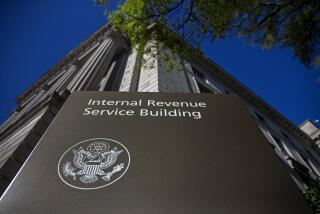Tax Indexing Is Back, but in Danger of a New Demise
- Share via
By now most Americans have forgotten the momentous change that was written into federal tax law in 1981--the “indexing” provision that prevents automatic tax increases from being triggered by inflation.
But if tax indexing were to be repealed, which could easily happen if ordinary citizens don’t keep a watchful eye, taxpayers would feel the pain quickly enough.
Indexing, which has been called a tax reform that only politicians could hate, involves the annual adjustment of income-tax brackets and deductions to take account of inflation the previous year.
It doesn’t produce a tax cut. Tax collections keep climbing in lock step with real economic growth and inflation-adjusted personal incomes. But it does save the taxpayer from automatic tax increases that would otherwise occur.
Using the current inflation-adjustment figure of 4.14%, the National Taxpayers Union calculates that a typical family of four earning roughly $49,000 a year will pay about $212 less in federal income tax in 1989 than it would without indexing.
If the inflation rate was 10% or more, as it was earlier in this decade, the benefit would be far, far greater.
Indexing didn’t actually begin until 1985, then stopped in 1987 to allow phasing in of the new tax reform rates and rules. Now indexing has resumed, without fanfare, effective with the 1989 tax year.
Tax indexing, however, will be a very tempting target as Congress and the Administration shop for politically acceptable ways of making room for new spending programs and/or cuts in the budget deficit.
The numbers are impressive.
If you assume an average inflation rate of 4.6%, the Congressional Budget Office says that federal taxpayers will pay about $128 billion less over the next five years than they would in the absence of indexing.
Looked at another way, that means tax revenues could be raised by $128 billion, simply by repealing tax indexing.
President Bush didn’t mention indexing in his budget message to Congress, and so far there is no significant move for repeal on Capitol Hill. But that could change.
It’s worth noting that Drew Lewis, the Republican co-chairman of a bipartisan commission studying the deficit, included suspension of tax indexing on his list of revenue-raising options that “have merit.”
Repeal of indexing shows up perennially on the Congressional Budget Office’s list of options for tax increases. And, truth to tell, most politicians would be happier without indexing precisely because of the extra revenues that inflation-driven “bracket creep” otherwise produces.
It’s important to understand how the system worked before indexing. Say living costs were rising by 8% a year and a worker’s pay increased by the same percentage. The purchasing power of his paycheck nonetheless went down because his raise threw him into a higher tax bracket. His tax obligation rose faster than his pay.
Politicians found the inflation dividend convenient. The system effectively produced large tax increases without Congress having to vote for them. However, the movement for tax indexing--which had existed for years in some countries--became irresistible with the rise of double-digit inflation in the late 1970s and early ‘80s.
Under the 1981 act, the standard deduction for married taxpayers filing jointly is expected to increase by $200 this year. The 28% tax bracket will begin to apply at $30,950 of taxable income for married couples, up $1,200 from 1988.
If tax indexing is under-appreciated, it is partly because inflation had fallen to around 4% by the time indexing took effect in 1985. It has been relatively tame ever since.
However, even at the present modest level of inflation, indexing brings significant savings to the average family. Those savings will become much larger and more important if fears of renewed inflation prove well-founded.
But any calls for repeal or suspension of indexing should be rejected not just by people who read George Bush’s lips, but even by those who consider higher taxes inevitable.
Indexing, keep in mind, is not a rich man’s tax loophole. On the contrary, low-income families would feel the pain of repeal far more than people making several times as much. The meaning of indexing to a millionaire is near zero.
Then there’s the question of plain honesty. Indexing forces the government to justify a tax increase instead of letting taxes rise automatically with no legislative action. And by removing the government’s ability to raise taxes without an explicit vote of Congress, indexing encourages greater discipline in spending.
Finally, once repealed it might never be possible to enact indexing again.
Economic realities may make a tax increase the lesser of evils. The American people, however, would do well to keep their elected representatives on notice that any tax hike should be debated and passed in the open--not through repeal or erosion of one of the most important safeguards in the tax laws.
More to Read
Get the L.A. Times Politics newsletter
Deeply reported insights into legislation, politics and policy from Sacramento, Washington and beyond. In your inbox twice per week.
You may occasionally receive promotional content from the Los Angeles Times.










